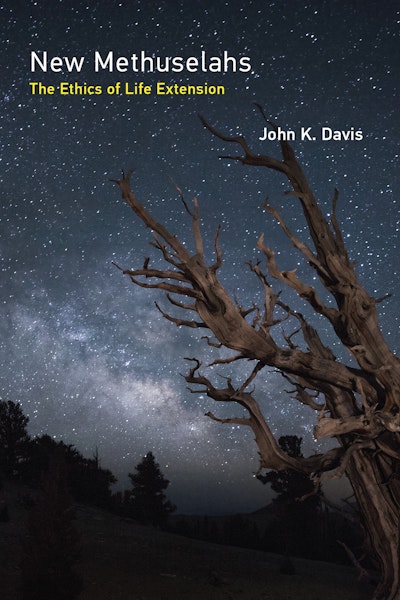- Published: 19 March 2024
- ISBN: 9780262551564
- Imprint: MIT Press Academic
- Format: Paperback
- Pages: 368
- RRP: $95.00
New Methuselahs
The Ethics of Life Extension
- Published: 19 March 2024
- ISBN: 9780262551564
- Imprint: MIT Press Academic
- Format: Paperback
- Pages: 368
- RRP: $95.00
"Davis provides an innovative ethical analysis of life extenstion that is a must-read for bioethicists interested in the ethics of an aging intervention. Deploying a strategy that considers the impact radical life extension would have on three distinct groups—what he calls the Haves, the Have-nots, and the Will-nots—Davis addresses important considerations like boredom, justice, population growth, and welfare. His conclusions and policy recommendations deserve serious consideration and will help spur more debate on these timely and important issues."
—Colin Farrelly, Professor and Queen's National Scholar, Queen's University, Kingston, Ontario
"Some bioconservatives oppose efforts to extend the human life span. They predict that much-longer lives will stoke uncontrollable population growth, aggravate social inequality, and maybe even crush us under the weight of unfillable time. John K. Davis takes on these challenges and more in New Methuselahs. He makes the case that extended lives will enrich the welfare of human descendants. Longer lives will trigger the need for new social arrangements—especially in regard to controllling population—but those changes will be easy to accept in the face of more interesting and maybe more peaceable lives. Davis offers an original and thoughtful analysis of a desirable future for human descendants."
—Timothy F. Murphy, Professor of Philosophy in the Biomedical Sciences, University of Illinois College of Medicine, Chicago
"Although life-extension technology is often taken to be the stuff of science fiction, John Davis makes not only a sober and compelling case for its scientific practicality but also an equally compelling case for its adoption once it has been developed. Davis does not, however, merely address the ethical concerns that are raised by the prospect of life extension technology. He also outlines the policies that should be put in place to address some of the legitimate concerns (such as overpopulation) that would be raised by this technology's widespread use. Davis's book is thus a true rarity—a groundbreaking philosophical work that is ahead of the scientific advances that will give rise to the social and ethical questions that it addresses."
—James Stacey Taylor, Philosophy, Religion, and Classical Studies Department, The College of New Jersey
"Davis charts a couse between the naive optimism of overzealous life extension enthusiasts and the pessimism of bio-conservatives. New Methuselahs is replete with innovative and controversial proposals, including reproductive lotteries and additional taxes for those who opt to extend lifespan. This book should be read by anyone interested in or concerned about the individual and social impact of significantly longer lives."
—Christopher S. Wareham, Steve Biko Center for Bioethics, University of the Witwatersrand, South Africa
"John K. Davis advances a bold claim about human life extension."
—Notre Dame Philosophical Reviews
"Highly accessible, informative, and well-balanced. Indeed, the entire book is written in such a conversational and entertaining way that at first you might think it was aimed at a general audience."
—Maxwell J. Mehlman, Hastings Center Report
“New Methuselahs provides a great investigation into the ethics of life extension. It provides bold, thought‐provoking policy suggestions, which will no doubt stimulate future work on the topic. Anyone with an interest in life extension and ethics should read it.”
—Bioethics
“Whether or not adding a century or two to the human life span ought to be a priority is an ethical problem -- not that it will be answered as one. The potential rewards of throwing money at the first really promising development makes superlongevity a tech bubble bound to happen.”
—Chronicle of Higher Education
